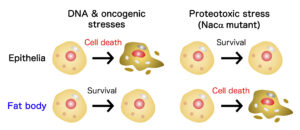Takayuki Yamada 1, Yuto Yoshinari 2, Masayuki Tobo 2, Okiko Habara 1, and Takashi Nishimura 1,2,* (1. Laboratory for Growth Control Signaling, RIKEN Center for Biosystems Dynamics Research (BDR)、2. Laboratory of Metabolic Regulation and Genetics, Institute for Molecular and Cellular Regulation (IMCR), Gunma University、*: Corresponding author)
About
Cells in our body are subject to various stresses and damages, many of which are repaired. When the damage is severe, cells die by programmed cell death (apoptosis). However, how cells in different tissues respond to apoptotic stimuli in vivo, and how the response varies with developmental stage, has been poorly understood. In this study, the research team found that fat body cells of the fruit fly Drosophila are resistant to various apoptotic stimuli, such as DNA damage and cancer stress. On the other hand, they discovered a novel genetic mutant that specifically induces cell death in fat bodies. In this mutant, protein homeostasis was disrupted and the cell death signaling pathway was activated. In addition, there was a stage specificity in which cell death was induced during development. Furthermore, the early onset of cell death by DNA damage and starvation stress in this mutant revealed a cell type-specific vulnerability due to disruption of protein homeostasis. The results of this study are expected to be used and applied as a new biological model to induce cell death in cancer cells and other apoptosis-resistant cells.
Paper information
Yamada T, Yoshinari Y, Tobo M, Habara O, and Nishimura T. Nacalpha protects the larval fat body from cell death by maintaining cellular proteostasis in Drosophila. Nat Commun. 2023 Sep 1;14(1):5328.
Online URL
https://www.nature.com/articles/s41467-023-41103-1








